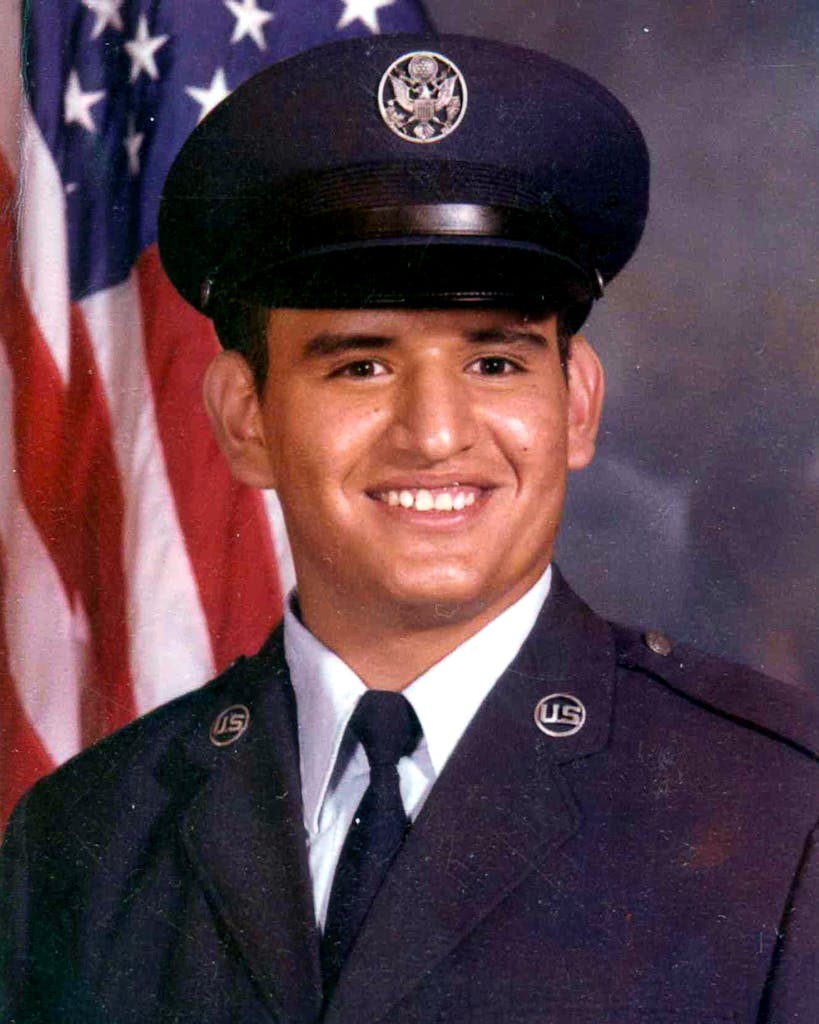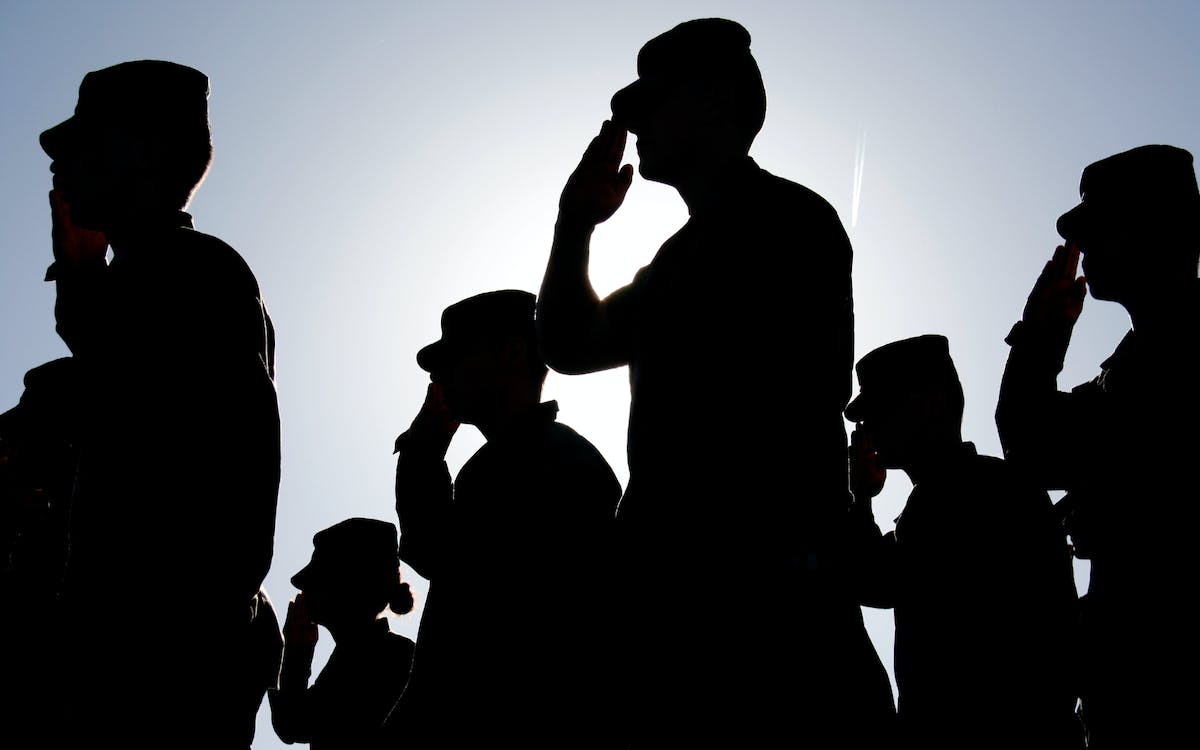I grew up an Air Force brat raised on G.I. Joe at the tail end of Reagan’s America. By age four, I could look up into the sky and identify airplanes by their silhouettes. I was surrounded by the rites and rituals of patriotism and nation and performed the catechisms of duty, obligation, and service daily. The pledges of allegiance to the flag—not prayers for daily bread or forgiveness—echoed in chorus. I could see the discipline required for national discipleship in the way my father stood at attention, saluted, and listened to the anthem.
I learned my first Latin not in the church but from the Air Force. Not the “e pluribus unum” found on our coins, but the “mors ab alto” from the patch on my father’s uniform. The messages ran together in my young mind—”out of many, one” and “death from above.” The phrases reinforced each other. It seemed that the ability to rain death from above provided the ability for many to become one.
My father was a soldier, and as a family we were proud of that. He served twenty years, and we spent a good deal of time on Air Force bases. In fact, my two siblings and I were born on one. But people have still yelled at me to “go back to where you came from.”

In the eighties, my father made a return trip from boot camp to his hometown of El Paso; my grandfather drove him to the airport. In the middle of their goodbyes, a Border Patrol agent interrupted and demanded that my grandfather show his papers as proof that he was in the country legally. My father stood next to him in his uniform. He’s told me, sometimes only half-jokingly, that he didn’t learn he was Mexican until he joined the Air Force.
My Mexican American father was not alone in being a soldier and a suspect citizen. Many Latinos experienced this before him. Their patriotism couldn’t always change their place in the nation and their part in its imagination.
In 1941, a twentysomething poet from Brownsville wrote a poem called “The Four Freedoms.” That same year, President Franklin Delano Roosevelt had delivered a speech by the same name, announcing a world founded upon four essential freedoms that were to be the pillars of a new peaceful international order that the U.S. would help create after World War II. Down in South Texas, the poet, Américo Paredes, was not convinced. “Este país de ‘Cuatro Libertades’ / nada nos puede dar,” he wrote. (“This country of ‘Four Freedoms’ / can give us nothing.”) Paredes, who grew up during a period of state-sanctioned violence against Mexicans and Mexican Americans, wasn’t so sure the U.S. was in any position to promise his community freedom and justice, let alone the world. And yet, the same year he wrote that poem, he enlisted in the Army. He wrote for Stars and Stripes and even covered the Japanese war crime trials after the war. After nearly four years of service, in 1945, he wrote a poem describing his complex nostalgia. Scenes like the ones painted by Norman Rockwell, or photographs like the famed kiss celebrating Victory Over Japan Day in Times Square, portrayed the nation a certain way. That nation never existed for Paredes. He wrote that he was “homesick for a home I’ve never lived in.”
In 1948, the remains of Private Felix Longoria were returned to his hometown of Three Rivers, Texas. Longoria had been killed in action in the Philippines. The only funeral parlor in town refused to hold his wake because Longoria was Mexican American. Civil rights leader and American GI Forum founder Héctor P. García wrote letters and op-eds about the injustice of segregation that had haunted Longoria even in death. Eventually Longoria would be buried with full honors at Arlington National Cemetery, but he would never receive his rightful homecoming.
The importance of the military was not lost on Latino populations in the postwar years. Many saw military service and the GI Bill as the avenue to the middle class. The military, more than any other institution, allowed access and promised socioeconomic mobility. A storied 1947 conversation between famed Mexican American lawyer Gus Garcia and liberal politician Maury Maverick Jr. at the Gunter Hotel, in San Antonio, highlights this notion. It was rumored that García, after debating with Maverick for a lengthy amount of time, turned to him and exclaimed, “You damn gringos can have the Alamo. We Mexicans want Kelly Field.”
Hundreds of thousands of Mexican Americans and other Latinos served in the military during the decades that spanned the two world wars and the Korean War. Their service created within the population a sense of “warrior patriotism,” as historians George Mariscal and Lorena Oropeza have described it. Military service was directly connected to Latino civil rights during those decades. These were real men and real Americans because they had fought and died in American wars. Their service, they reasoned, made them first-class citizens and should have given them access to government-subsidized home loans and college tuition. Instead, many encountered discrimination. Returning Latino GIs were not always allowed to purchase homes in the neighborhoods of their choosing. Government maps marked certain neighborhoods as safe for home loans and others—overwhelmingly communities of color—as too risky. Unable to build in neighborhoods like West Dallas or purchase new homes in suburbs, many Latinos were relegated to the barrios. Famously, in Los Angeles in 1949, city councilman and veteran Edward Roybal was denied by a builder because he was Mexican American. And while many Latino GIs attended college on the GI Bill, many more were denied admission by individual institutions.
Yet by the sixties and seventies, plenty of young Latinos were still enlisting. Raised on the South Side of San Antonio, the Chicano author Michael W. Rodriguez explained in a short story that “serving in the Armed Forces of the United States was something we grew up knowing we were going to do, so we did it. De verdad, we looked forward to it.”
While President Lyndon B. Johnson believed the war in Vietnam overshadowed his War on Poverty, his assistant secretary of labor, Daniel Patrick Moynihan, believed that both wars could work toward the same purpose. The military could be a mix of finishing school and technical college for those who had failed to learn in public schools, churches, or their own homes. “Very possibly our best hope is seriously to use the armed forces as a socializing experience for the poor,” Moynihan said. Vietnam vet and historian Ignacio M. García pointed to this critically in his memoir, writing that “the armed forces had often been the Chicano college life.” García, who grew up on San Antonio’s West Side, had good grades, decent test scores, and two scholarship offers. What he lacked was a quarter to make a phone call to verify the scholarships. Instead, with no money, he boarded a bus to see the Army recruiters. A short while later, he’d find himself in Vietnam.
Like their fathers, many Latinos hoped the military would lead them out of the barrios, in step with their fellow soldiers. But upon their return, they did not always find what they were promised. In a poem inspired by interviews with Mexican Americans in San Antonio, Carmen Tafolla describes a mother’s experience with her son when he came back from Vietnam. Both are still living in a housing project on San Antonio’s West Side. The mother is thankful her son returned at all, but she’s worried about him. He fights constantly because of racist insults and slights. She tries to comfort him, reminding him that his father had similar experiences and that things were much worse then. Even so, her son still cannot find a job.
Latino warrior patriotism was supposed to prove Latinos deserved to be treated equally. It hasn’t worked. Tens of thousands of veterans have been deported due to a law passed in 1996. Within the military, Latinos are underrepresented in leadership positions. Latinas have enlisted at higher rates than Latinos in recent decades, but the military is still plagued by issues of sexual harassment and sexual violence. The college exemptions allowed during the Vietnam War meant that working-class young men were forced to do most of the fighting, and today’s all-volunteer military service is still seen as operating a shadow “poverty draft,” with promises of college tuition and job training for primarily working-class teens. A 2020 report on Latinos in the military from Syracuse University found that “educational benefits” were the top motivation for enlistment; a close second was the desire to serve one’s country. While impoverished schools cut other kinds of educational programs, they are often funneling students of color into the Junior Reserve Officer Training Corps, a program that has tripled in size since the 1970s. Over 70 percent of Latino veterans would be happy if their children joined the military, but it is worth asking why some people’s children are duty bound while others’ are college bound.
My son has photos of his maternal great-grandfather, who served in the Navy, and his paternal grandfather, who served in the Air Force, on his dresser. He is proud of their service, and I am too. But I am torn. There were few opportunities available to them and they saw the military as their only way out.
While my son keeps my father’s Air Force induction photo on his dresser, I often think of another. In it, my father is in his early twenties, with a wide, youthful smile—mischievous and innocent. It is a smile I don’t recognize, a smile lost to age and responsibilities. It was taken after he and a group of friends got too loud and the military police were called to rein in the party. When an MP knocked, my father and the group of soldiers serenaded the officer to “Roxanne.” They snapped a picture. It was a silly stunt that could have happened in a college dorm, not a military barrack.
Our forever wars have begun and ended with Latinos. The first American POW to escape a Vietnamese prison was a Mexican American from El Paso, Isaac Camacho. The first Marine killed in the Iraq War was José Antonio Gutierrez, a 22-year-old Guatemalan immigrant who arrived without documents when he was 14. Five of the last soldiers to die in the retreat from Afghanistan were Latino.
Service to the nation is not wrong. But for Latinos, our patriotism must do more. After all, what good is it to rename bases after Latino generals when we can’t bring ourselves to say the names of Latinas killed on them? What justice will Fort Cavazos bring to Vanessa Guillen? What good is warrior patriotism when it does nothing to change the fact that we are still suspect citizens?














You must be logged in to post a comment Login